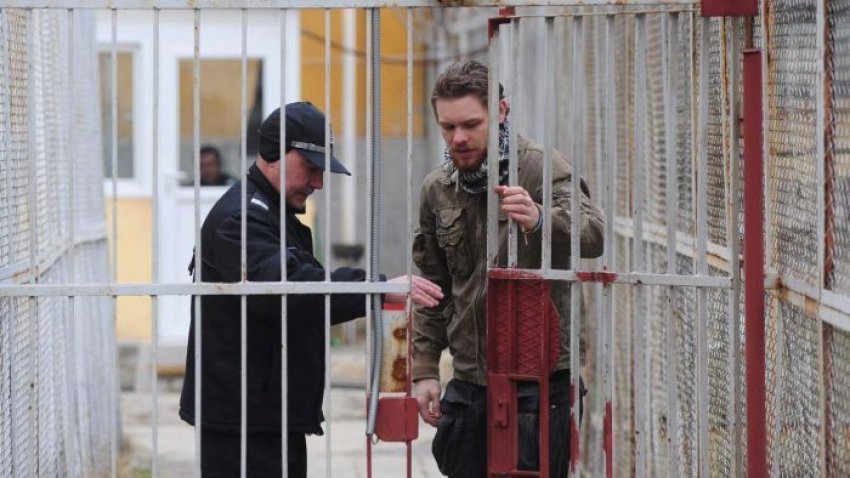
Jock Palfreeman, a prisoner rights activist in Bulgaria, has launched an international appeal for the prisoner support group he helped establish from inside Sofia Prison.
Palfreeman has been a prisoner for more than 10 years on trumped-up murder charges. He was instrumental in setting up the Bulgarian Prisoners’ Rights Association (BPRA), which has successfully changed the law.
Now, prison authorities are after him, accusing him of promoting “hate speech”. They say BPRA’s stickers sporting the well-known slogan “When injustice becomes the law, resistance becomes a duty” is evidence.
As a result, Palfreeman has been stripped of privileges for two years: he has been prevented from continuing his university studies; his visits have been severely limited; and he is not allowed any of the supervised leave he had been granted. He is also prevented from doing paid work.
Together with other long-term isolation prisoners, Palfreeman set up the first Bulgarian prisoner’s union in 2010. In 2012, it was officially registered — an important step in legitimising its work.
In December, Palfreeman told Alerta, a Polish newspaper, that the prison administration responded by immediately starting to investigate ways to sabotage the group.
“They knew we were a threat to the status quo which, of course, was corruption and torture,” he said.
“They were right to be afraid of us as, for the first time, there was a collective and organised front against their front of corruption. No longer could they pick us off one by one.
“Instead, what happened was that when the guards tortured a prisoner, we asked the prisoner if he wanted assistance and organised all the complaints and legal representation as well as alerting inspectors from outside.
“It became a lot harder for the prison to cover their crimes up. Victims and witnesses felt for the first time that there were people who cared and who had their backs, no longer were prisoners alone and this encouraged more prisoners to speak out and testify against prison staff mistreating themselves or others.”
In 2015, a BPRA office holder was invited to help draft new prison reform laws. Palfreeman recounts how their biggest problem was convincing others of the scope of the problems prisoners faced.
“We sent them copies of the court transcripts from prisoners’ parole hearings where the judges rejected parole based on reasons that had nothing to do with their time in prison or if they were rehabilitated or not.”
The BPRA representative informed the committee that less than 10% of prisoners had access to work. In Sofia Prison, where there are about 1000 prisoners, less than 100 are working or studying.
Palfreeman said that without the BPRA, the justice ministry would not have been able to come up with solutions.
In February last year, a new law came into force giving every prisoner access to a parole hearing. Previously, only the prison director could rule on whether a prisoner could even have a hearing — a major source of corruption and abuse.
Since then, BPRA’s work has helped prisoners access legal representation and inform them of their rights; make requests and appeals; and access medication. It has also helped organise the mass distribution of information on the new laws.
Creating a collective unified identity among prisoners was a crucial step, Palfreeman recounted.
Since last year, BPRA has been working on an archive and database to house court decisions, orders, laws and reports to help prisoners, their families and lawyers in their legal battles.
“If we can supply prisoners with our collective pooling of important documents then other prisoners will be able to defend themselves better,” Palfreeman said.
Prison authorities are targeting Palfreeman in their efforts to demoralise prisoners and undermine BPRA.
A June petition to Justice Minister Tsetska Tsacheva requests she step in to stop the “unlawful actions” of the Chief Penal Directorate under the auspices of Deputy Minister Nikolai Prodanov. It also asks for international solidarity.
Palfreeman stood up to 16 neo-Nazis in Sofia, Bulgaria, in 2007, when they attacked two young Roma boys. He was then set upon by the neo-Nazis. One of the attackers, Andrei Monov, son of a prominent politician, was stabbed and died. The Roma boys fled.
He was tried for murder and attempted murder, sentenced to 20 years’ jail and given a fine of $375,000. During the trial, critical CCTV footage was not shown and witnesses went missing. Forensic evidence suggesting that the fatal blow did not come from Palfreeman’s knife was not admitted.
In May, Palfreeman instructed his lawyer to withdraw his application for parole, saying it was bound to fail.
Palfreeman and the association he helped pioneer are a model of resistance. They need your support.
[Sign the petition to the Bulgarian Justice Minister here.]